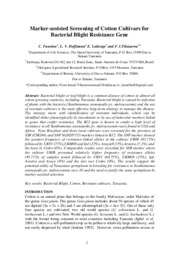Marker-assited screening of cotton cultivars for bacterial blight resistance gene.
Marker-assited screening of cotton cultivars for bacterial blight resistance gene.
Autoria: FAUSTINE, C.; HOFFMANN, L. V.; LUKONGE, E.; TIBAZARWA, F. I.
Resumo: Bacterial blight or leaf blight is a common disease of cotton in almost all cotton growing countries, including Tanzania. Bacterial blight is caused by infection of plants with the bacteria (Xanthomonas axonopodis pv. malvacearum) and the use of resistant cultivars is the most effective long-term strategy to manage the disease. The strategy starts with identification of resistant individuals, which can be identified either phenotypically by inoculation or by use of molecular markers linked to genes that confer resistance. The B12 gene is known to confer a high level of resistance to all Xanthomonas axonopodis pv. malvacearum races found in USA and Africa. Four Brazilian and three local cultivars were screened for the presence of SSR (CIR246) and SNP NG0207155 markers linked to B12. The SNP marker showed the greatest frequency of resistance-linked alleles in the cultivar UK08 (85.71%) followed by UK91 (75%),UKM08 and Ipê (25%), Araça(8.33%),Aroeira (7.1%) and the least in Cedro (0%). Comparable results were recorded for SSR marker where the cultivar UK08 presented relatively higher frequency of resistance alleles (85.71%) of samples tested followed by UK91 (68.75%), UKM08 (25%), Ipê, Aroeira and Araça (8%) and the last was Cedro (0%). The results suggest the potential utility of Tanzanian germplasm in breeding for resistance to Xanthomonas axonopodis pv. malvacearum race 18 and the need to purify the same germplasm by marker assisted selection.
Ano de publicação: 2015
Tipo de publicação: Artigo de periódico
Unidade: Embrapa Algodão
Palavras-chave: Algodão, Bacterial blight, Bactéria, Gene, Germoplasma, Molecular marker, Xanthomonas axonopodis pv malvacearum, cotton
Observações
1 - Por padrão são exibidas publicações dos últimos 20 anos. Para encontrar publicações mais antigas, configure o filtro ano de publicação, colocando o ano a partir do qual você deseja encontrar publicações. O filtro está na coluna da esquerda na busca acima.
2 - Para ler algumas publicações da Embrapa (apenas as que estão em formato ePub), é necessário ter, no celular ou computador, um desses softwares gratuitos. Sistemas Android: Google Play Livros; IOS: iBooks; Windows e Linux: software Calibre.
Acesse outras publicações
Acesse a Base de Dados da Pesquisa Agropecuária (BDPA) para consultar o acervo completo das bibliotecas da Embrapa.

